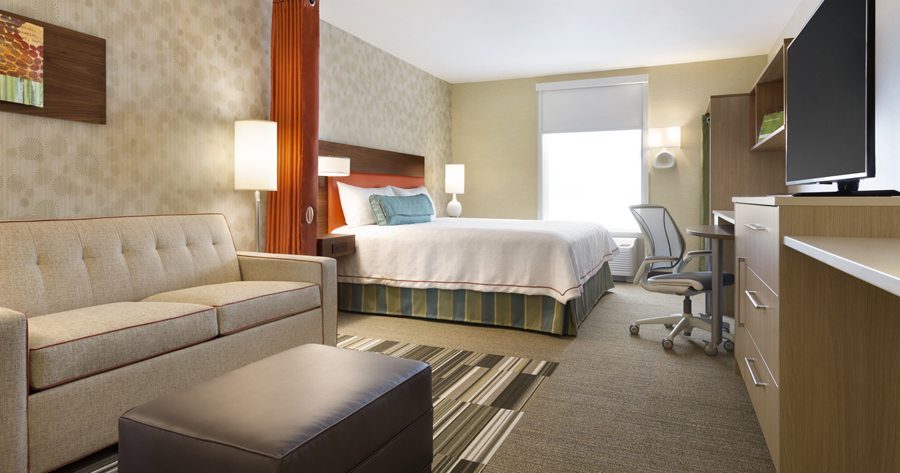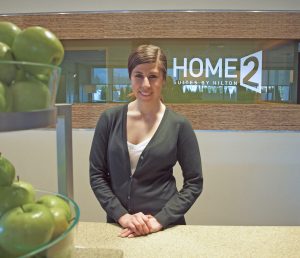
Home » Richland hotel caters to travelers seeking more sustainable amenities
Richland hotel caters to travelers seeking more sustainable amenities

April 12, 2018
Hilton Home2 Suites focuses on eco-friendly options throughout facility
Richland’s new Hilton Home2 Suites appeals to travelers’ increasing environmental consciousness and desire for more sustainable amenities.
The Queensgate area hotel’s sales manager, Berenice Trevino, said she’s interacted with guests who specifically seek out Home2 Suites for this reason and said hotel reviews often mention the green amenities.
“We’re one of the only sustainable hotels in our region,” she said.
Home2 Suites was Hilton’s first new brand in 20 years when it was introduced in 2009.

“Hilton started with this brand to try to push forward and catch up with the times,” Trevino said, adding that the company is using the concept as a flagship to guide the evolution of its other brands.
Born and raised in Pasco, Trevino sees Home2 Suites as a “fresh, new innovative addition to the Tri-Cities.”
The pet-friendly Richland Home2 Suites represented the debut of the brand in Eastern Washington when it opened in February 2017.
Trevino and her team predominantly serve Hanford contractors and medical personnel traveling to the area for work.
Hilton operates 264 Home2 Suites franchises across the United States, Mexico and Canada, with a total of four locations in Washington state. The other three locations are along the Interstate 5 corridor.
“A ton more are being built,” Trevino said. “It’s kind of the thing to do if you’re a Hilton franchisee; (Home2 Suites hotels) are simpler to construct and maintain.”
She went on to explain how the Home2 Suites brand aesthetic is more scaled back, minimalistic and modern.
“It’s a little more simplified … there’s not a lot of bulk in the rooms,” she said. “Almost every square inch of the hotel rooms and public spaces aid that sustainable program.”
She said some of the carpeting, wallpaper and cabinetry in the rooms are made of recycled materials, and all of the suites’ kitchenettes are stocked with reusable ceramic dishes, glasses and cutlery visitors would find in their own home. Recycling bins also are provided in each room.
Dual flushing toilets provide opportunities to save water, and bulk shower gel and shampoo dispensers are mounted in the showers to reduce the amount of plastic waste generated from travel size containers usually provided in hotels, though these are available upon request.
Trevino said one of Hilton’s longest standing sustainability programs is the company’s involvement in the “Clean the World Act,” through which Hilton recycles used and unused travel-size soaps left behind by guests.
Once a month, Hilton’s hotel branches send what they’ve collected to the Clean the World organization, which filters and removes all debris from the donated soap, then transforms it into new bars to be distributed to people in Third World countries.
Trevino said Clean the World’s work has contributed to the reduction of mortality rates in these countries by a huge margin by providing access to hygiene and regular handwashing, practices which help reduce the threat of disease-causing bacteria.
“I really appreciate (Hilton’s) standards and what they’re doing to not just be a building somewhere where people stay. It really means a lot to the community and the environment,” Trevino said.
In the breakfast area, guests dine on ceramic dishes and use silverware. Though the napkins are paper, they are made out of recycled fibers. The coffee and tea station is stocked with ceramic mugs, and to-go cups made from recycled material are available.
Home2 Suites also focuses on offering products which come in mostly recyclable packaging or are made from recycled materials.
Home2 Suites also has shifted toward digital room keys. Guests can access their room using their phone, instead of a plastic card key, though cards still are available. Guests also can opt for electronic receipts when paying for their stay.
The hotel also has extended its sustainability program to its pool and spa areas, which are saline, as opposed to relying solely on chlorination. As Trevino explained, not only is this easier on the environment, but easier on guests.
“It’s not going to dry out your skin … you can open your eyes underwater and it’s not going to burn,” she said.
Trevino said Hilton continues to refine its sustainable hotel concept. The hotel developer recently launched a new brand, Tru, which also will offer an extensive sustainability program.
Geared more toward nightly bookings and the millennial traveler, Trevino said Tru is even more scaled back than Home2 Suites.
“It’s very simple,” she said. “They’re going to have really small staffs and less rooms in the hotel.”
Trevino said Hilton also is considering combining the two complementary brands at some locations, such as attaching a Tru hotel to a Home2 Suites.
A lot of sustainable business practices don’t cost more to implement, but rather save money in both the short- and long-term, said Trevino, who added that even little things make a difference.
“Going paperless is huge,” she said. “And unsubscribing from physical mailings.”
Trevino said Hilton is working on going paperless across all of its brands.
She also cited that a reduction in the use of plastics and disposables can have a major effect on a company’s bottom line, saving on the high cost of waste disposal. Commercial curbside recycling in Richland doesn’t cost that much more to add on, she said.
“You can’t do worse; you can only do better by being sustainable,” Trevino said.
Information: home2suites3.hilton.com, 509-460-4040, or 2861 Lincoln Landing, Richland.
Local News Environment
KEYWORDS april 2018




